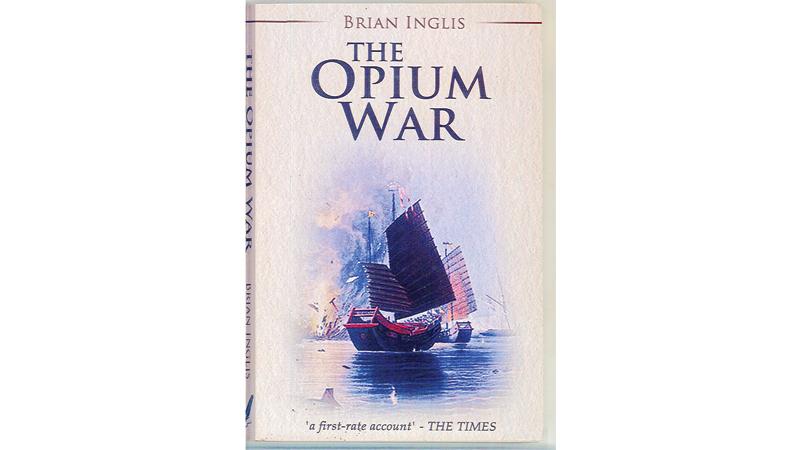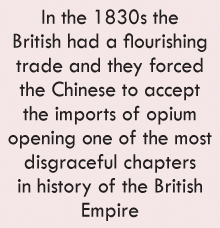
Title: The Opium War
Author: Brian Inglis
Publisher: Endeavour Ink, London, UK
The Opium War is essentially about two empires waging war over narcotics in the 19th century. The Western powers waged two wars against the Qing Dynasty of China in the mid-19th century. The wars were triggered by the dynasty’s campaign to enforce its prohibition against British and American merchants who sold opium produced in India and Turkey to Chinese smugglers.
The first opium war was fought by China against the United Kingdom from 1839 to 1842. The second opium war was waged by the Qing dynasty against the United Kingdom and France from 1856 to 1860. The European forces defeated the Qing forces easily with their sophisticated military technology. As a result, the Chinese government was obliged to grant favourable tariffs, trade concessions, reparations and territory to the Europeans.
The war and the subsequent treatises weakened the Qing dynasty’s hold on the government and they had to open ports that handled all trade with imperial powers. China had to also hand over Hong Kong to the British.
Disgraceful chapters
 In the 1830s the British had a flourishing trade and they forced the Chinese to accept the imports of opium opening one of the most disgraceful chapters in history of the British Empire. Opium exports became crucial to the British economy. While the British were addicted to the opium revenue the Chinese were addicted to the drug itself.
In the 1830s the British had a flourishing trade and they forced the Chinese to accept the imports of opium opening one of the most disgraceful chapters in history of the British Empire. Opium exports became crucial to the British economy. While the British were addicted to the opium revenue the Chinese were addicted to the drug itself.
The author of ‘The Opium War’ is an Irish journalist, historian and television presenter in Britain. He was the presenter of “All our yesterdays.” His publications included biographies and books on medicine and psychology. He gives us a brisk, lucid and detailed account of the Opium Wars. The book is an epic that appeals to readers. The author has treated the opium trade as an abomination. However, he does not object to the drug per se on moral grounds.
The story begins in India. Opium, grown under horrible conditions, was harvested, packed and shipped to China with twofold aims. One was to maximize the flow of revenue and ensure plausible deniability for the crown.
The author is seen in the role of a prosecutor building a case against the British establishment. However, the self-correcting capacity of British capitalism and the powerful impulses for reform are missing from his account.
Likewise absent from the Opium Wars are references to many wonderful advances in science and technology in the 1800s enabled by the capital accumulation which made human life better and bearable.
The first Opium War began in 1839 over trading rights, open trade, and especially diplomatic status.
Opium cultivation
In the 18th century China had a trade surplus with Europe. In the late 18th century the British East India Company expanded the cultivation of opium in its Indian territories and sold it to private traders who transported it to China and passed it on to Chinese smugglers.
The contraband was freely available in Chinese markets. As a result, Many Chinese became addicted to opium. Meanwhile the Chinese Emperor issued two edicts making opium illegal and charged the High Commissioner with ending the trade.
Chinese soldiers enforced a shutdown and blockade of the factories. The Superintendent of British Trade in China Charles Elliott wrote to London advising the use of military forces against the Chinese on 21 June 1840. A British naval force arrived off Macao and moved to bombard the port of Dinghai.
In the ensuing conflict the Royal Navy inflicted heavy damage to the Chinese Empire. The war was concluded with the Treaty of Nanking in 1842. The treaty forced China to cede Hong Kong to the United Kingdom. Another treaty in the following year gave the most favoured nation status to the British Empire. France secured the same concessions in treaties of 1843 and 1844.
Riot in Canton
In October 1856 the new Imperial Commissioner seized a British vessel carrying opium as it was still technically illegal to do so. In Canton a riot broke out against missionary activities. European commercial properties were set on fire and a French Christian missionary was executed.
This paved the way for the second opium war. The European allies now sought greater concessions from China including legalization of the opium trade, opening all of China to British merchants and opium traffickers, and exempting foreign imports from internal transit duties.
The war resulted in the Treaty of Tension (1858). It forced the Chinese to pay reparations for the expenses of the war and grant foreign traders and missionaries the right to travel within China. After a second round of fighting which included the ransacking of the old Summer Palace and the occupation of the Forbidden City Palace complex in Beijing, the treaty was confirmed by the Convention of Peking in 1860. With the treaties the opium wars ended.
The question that should be answered is whether one could put the blame for the war on the British government’s determination that the Chinese should continue to accept opium from India, whether as a legal importation or as a contraband.
One might argue that the British expedition to punish the Chinese authorities was an empire’s predictable response to a perceived affront. The real surprise would have been if the British had done nothing.
The British action may not have been pretty, it may not have been ethical, decent or wise – but it was in keeping with the behaviour of imperial armies throughout history. The Opium War is scholarly and very readable. It is a first rate account.
